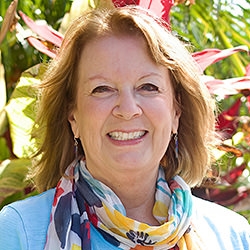

Search Results: openness
-
Judgment is an attempt to protect from hopelessness or insecurity, at high cost. Instead, check in with fear, grief, or hurt. Then wonder what needs are at stake for everyone. This makes space for grief instead of anger, for negotiation rather than control, and for "calling in" rather than excluding. Wonder: “For whom would this be life-serving or not?”, “What strategies would care for all needs?” or, “What can I contribute now?”
-
Two NVC trainers went into dangerous, war torn territory to share the skills they found so valuable but end up learning that they need to first apply those skills before those they came to help could receive what they had to offer. Only when the foundation of connection and trust was built could they mediate the conflicts using empathic communication.
-
Trainer Tip: In challenging situations, we can be peaceful and clear when we are able to connect to what we value most, and to act in harmony with those values. For example, if a coworker does something you don't like, instead of gossiping about their undesirable behaviors, you can talk to them about how both of you feel regarding what happened, and focus on the needs you're both trying to meet at work.
-
What does nonviolence have to do with group facilitation?
Miki Kashtan believes that nonviolence is a way of being and living that orients us in all our thoughts, words and deeds toward the integration of truth, love and courage. All nonviolent individual and collective actions are aimed at preserving what serves life and challenging what does not. Facilitation is one clear path for bringing nonviolence to the world!
How can we act now, as facilitators, as if the world of our dreams, the Beloved Community, is already in place?
-
Experience a deep process of self-connection and meaningful self-discovery.
-
When Dian works with managers, they often ask how they can manage others more effectively. She almost always asks them: how are you managing yourself?
This question applies to all aspects of life, both at work and at home. How are you: 1) gaining clarity around your needs; 2) managing your internal reactions; and 3) clarifying your requests before you open your mouth (or judge) others? This is why self-empathy – which Dian calls “self-management,” now a buzzword in business – is central to the practice of Nonviolent Communication.
Yet self-empathy is not always easy, especially if events in your life stimulate old, “fossilized” needs. These “fossilized” needs are often precognitive and connected to trauma, and as a result, “live” in your muscle memory. In order to fully release this “stuck” energy, it is necessary to engage your felt-sense while learning to empathize with your body and deeply connect with your younger parts.
Dian calls this process Somatic Self-Empathy (SEE).
-
Inbal offers parents and anyone with children in their life a lucid discussion of the important role self-empathy plays in creating healthy, supportive relationships.
-
- Reclaim the lost voices of your ancestors
- Understand the impact of collective trauma on your family line
- Open yourself up to have more warmth for yourself and your children
- Restore the flow of love and energy from past generations
-
- Discover what is yours to do in response to our growing global crises
- Weave nonviolence more deeply into how you live and lead
- Receive ongoing support within and beyond the course in how to be effective and alive while doing what’s yours to do
- Increase your capacity to face and mourn current reality as a source of greater choice and energy
- Be a part of transforming the legacy of scarcity, separation, and powerlessness into a livable future
-
-
-
How do our nervous systems sync during connection, and what happens when disconnection occurs? In this Sarah Peyton video, we explore the profound interdependence of human relationships through the lens of Nonviolent Communication (NVC).
-
When working to repair a relationship after conflict, and after reaching mutual care and understanding, you’re more likely to prevent future disconnection in similar situations by coming to clear, specific, and actionable agreements. Ensure requests for agreements come from a negotiable needs-based dialogue. Clarify specifics and plan to revisit agreements to assess their effectiveness.
-
- Learn the essentials of NVC from its founder, Dr. Marshall Rosenberg
- Discover how to connect with others with empathy, integrity, and peace
- Understand the origins of NVC and how to apply it within yourself and in your life
- Experience how empathy supports healing in your most intimate relationships— and in the world at large!
-
-
-
CNVC Certified Trainer Arnina Kashtan talks about what she calls "witnessing humanity," touching on the gift of presence, empathy vs. identification and staying present in the face of intensity.
-
Discover how fostering strong attachment and connection with your child can lead to fewer conflicts and more harmonious interactions. Ingrid Bauer offers practical guidance on using empathy, self-connection, and consistent care to create a secure and loving environment for your child.
-
Join Jim and Jori Manske in a thought experiment exercise designed to help us become more aware of our conditioning, allowing us to make more conscious and connected choices in the face of conflict.
-
Our "felt-sense" can provide crucial information about our experience and our lives. It can also help us integrate and retain information. This can also bring greater access to internal resources, choice, open heartedness, collaboration and creative solutions. From there, profound insight and transformation can follow. Here's how we can harness that...

Quick Links
Subscription Preferences
Stay In Touch!
Looking for ways to keep up with NVC Academy news, get special offers, free resources, or words of inspiration? Here are five ways to stay engaged:


















